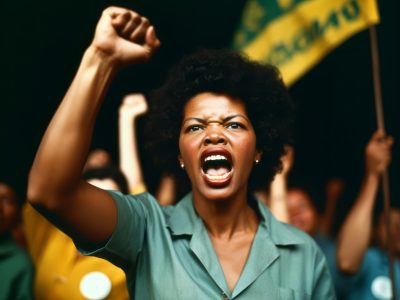Black nationalism is a political and social movement that advocates for the empowerment, self-determination, and unity of Black people, primarily in the context of the African diaspora. It emerged as a response to centuries of racial discrimination, oppression, and colonialism faced by Black communities around the world. Black nationalists argue for recognising and celebrating Black identity, culture, and history, as well as pursuing social, economic, and political independence.
Fundamental principles and features of Black nationalism may include:
- Self-determination: Black nationalists often emphasise the importance of Black communities having control over their own destinies. This can manifest in demands for autonomy and self-governance in areas with significant Black populations.
- Pride in Black culture and heritage: The movement encourages the celebration and preservation of African and African-American culture, including language, art, music, and traditions, as a means of fostering a strong sense of identity and unity.
- Economic empowerment: Black nationalists may advocate for economic self-sufficiency and developing Black-owned businesses and institutions to combat economic disparities.
- Political activism: Many Black nationalist movements have been involved in political activism and advocacy, working to challenge systemic racism and injustice through political means.
- Resistance to oppression: Black nationalists often view themselves as part of a broader struggle against racism, colonialism, and white supremacy. This can include advocating for civil rights, protesting against police brutality, and supporting international liberation movements.
It’s important to note that Black nationalism is not a monolithic ideology, and the movement has various interpretations and approaches. Some Black nationalists advocate for separatism or the creation of independent Black nations. In contrast, others seek to reform existing systems to achieve equality and justice. Additionally, Black nationalism has historical roots in different countries and regions, with variations in focus and goals based on local contexts.
Prominent figures associated with Black nationalism include Marcus Garvey, Malcolm X, the Black Panther Party, and, more recently, individuals and organisations advocating for racial justice and empowerment in various forms. The movement continues to evolve and adapt to contemporary challenges and circumstances.
Black nationalism vs Pan-Africanism
Black nationalism and Pan-Africanism are related ideologies that share some common goals and principles, and they have often intersected in the broader struggle for the empowerment and liberation of Black people worldwide. While they are distinct concepts, they are closely linked in many ways:
- Emphasis on Black identity and unity: Both Black nationalism and Pan-Africanism emphasise the importance of Black identity, culture, and unity. They recognise the shared experiences of people of African descent and aim to foster a sense of solidarity among Black communities.
- Self-determination: Black nationalism and Pan-Africanism both advocate for self-determination, focusing on Black people having control over their destinies. This can manifest in calls for political, economic, and social empowerment.
- Opposition to colonialism and racism: Both movements oppose colonialism, imperialism, and racial oppression. They seek to challenge systems of white supremacy and work towards the dismantling of racist structures.
- International perspective: Pan-Africanism, as the name suggests, has a more explicitly international focus, aiming to unite Black people across the African diaspora, including those in Africa and the African diaspora in the Americas, Europe, and other regions. Black nationalism, on the other hand, often focuses on specific Black communities within particular countries or regions. Still, it can also align with Pan-Africanist goals when advocating for global Black solidarity.
Diverse approaches: While Black nationalism and Pan-Africanism share common themes, they can take on different forms and strategies depending on the specific context and the individuals or organisations involved. Some proponents may emphasise separatism and the creation of independent Black nations (more common in Black nationalism), while others may focus on international cooperation, diplomacy, and advocacy (more common in Pan-Africanism).
Marcus Garvey and Malcolm X, for example, have been associated with both Black nationalism and Pan-Africanism. Marcus Garvey’s Universal Negro Improvement Association (UNIA) promoted Black nationalism and also advocated for a unified Pan-African identity. Malcolm X’s advocacy for Black empowerment and international solidarity also aligned with both movements.
While Black nationalism and Pan-Africanism are distinct ideologies, they are closely related and often intersect in their goals and principles. Both movements have played significant roles in the fight against racism, colonialism and the pursuit of empowerment and equality for Black communities worldwide.





